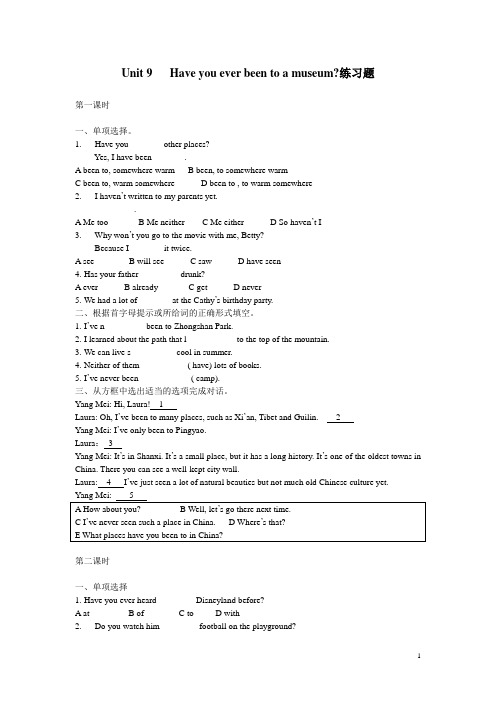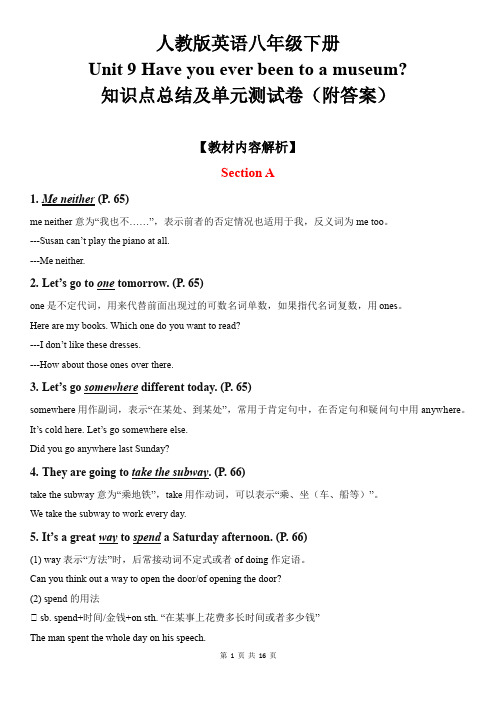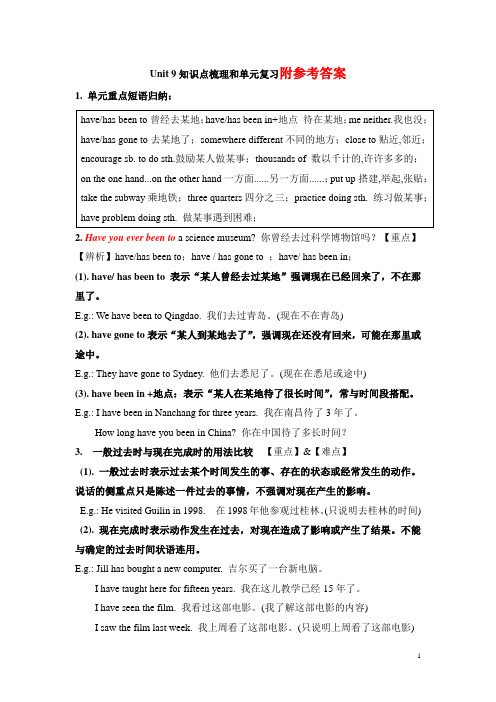初二下册_Unit_9_Have_you_ever_been_to_museum_讲解+练习题目+答案
八年级英语下册Unit_9___Have_you_ever_been_to_a_museum过关

Unit 9 Have you ever been to a museum?练习题第一课时一、单项选择。
1.--- Have you _______ other places?--- Yes, I have been _______.A been to, somewhere warmB been, to somewhere warmC been to, warm somewhereD been to , to warm somewhere2.--- I haven’t written to my parents yet.--- _________.A Me tooB Me neitherC Me eitherD So haven’t I3.--- Why won’t you go to the movie with me, Betty?--- Because I _______ it twice.A seeB will seeC sawD have seen4.Has your father ________- drunk?A everB alreadyC getD never5.We had a lot of _______ at the Cathy’s birthday party.二、根据首字母提示或所给词的正确形式填空。
1.I’ve n_________ been to Zhongshan Park.2.I learned about the path that l___________ to the top of the mountain.3.We can live s__________ cool in summer.4.Neither of them __________ ( have) lots of books.5.I’ve never been ___________ ( camp).三、从方框中选出适当的选项完成对话。
新版八年级英语下册unit_9_have_you_ever_been_to_a_museum_Section_A_1

你曾经去过 博物馆吗?
语言目标: 讨论过去的 经历
1a Which of these places would you like to visit? Rank them from 1(most) to 6 (least).
space museum____ history museum____ art museum ____ zoo ____ water park ____ amusement park ____
Listening 2 2a
Look at the map of the town. Listen and circle the places you hear.
Listening 2 2b Listen again and circle T for true or F for false. Conversation 1 1. Tina went to the space museum last year. T/F 2. John has never been to the space museum. T/F 3. They are going to take the subway. T/F
improve
progress
unusual peaceful invented rapid
Have you ever been to science museum?
Yes, I’ve been to a science museum
No, I’ve never been to a science museum Yes, I have. I went there last year,/No, I haven’t. Me, too. And I’ve also visited the nature museum.
人教版英语八年级下册Unit 9 Have you ever been to a museum知识点总结及单元测试卷(附答案)

人教版英语八年级下册Unit 9 Have you ever been to a museum?知识点总结及单元测试卷(附答案)【教材内容解析】Section A1.Me neither (P. 65)me neither意为“我也不……”,表示前者的否定情况也适用于我,反义词为me too。
---Susan can’t play the piano at all.---Me neither.2.Let’s go to one tomorrow. (P. 65)one是不定代词,用来代替前面出现过的可数名词单数,如果指代名词复数,用ones。
Here are my books. Which one do you want to read?---I don’t like these dresses.---How about those ones over there.3.Let’s go somewhere different today. (P. 65)somewhere用作副词,表示“在某处、到某处”,常用于肯定句中,在否定句和疑问句中用anywhere。
It’s cold here. Let’s go somewhere else.Did you go anywhere last Sunday?4.They are going to take the subway. (P. 66)take the subway意为“乘地铁”,take用作动词,可以表示“乘、坐(车、船等)”。
We take the subway to work every day.5.It’s a great way to spend a Saturday afternoon. (P. 66)(1) way表示“方法”时,后常接动词不定式或者of doing作定语。
Can you think out a way to open the door/of opening the door?(2) spend的用法① sb. spend+时间/金钱+on sth. “在某事上花费多长时间或者多少钱”The man spent the whole day on his speech.The family spent 10,000 dollars on their trip.① sb. spend+时间+(in) doing sth. “花费多长时间做某事”The boy has spent two hours playing the computer games.【拓展】辨析spend, pay, take和cost6.We put up a tent and cooked outside. (P. 66)put up意为“搭建”,还可以表示“举起、张贴”。
新版新目标八下教案Unit-9--Have-you-ever-been-to-a-museum

《Unit 9 Have you ever been to a museum? 》一、教学目标:1. 语言知识目标:掌握如何表达现在完成时,并能运用Have you ever been to an amusement park? Has he ever been to an amusement park? 的句式进行提问和应答。
2. 情感态度价值观目标:能用英语谈论过去的经历,谈论你曾经去过某地。
二、教学重点:(1)掌握本课的生词、短语和本课所出现的日常交际用语。
(2)掌握有关于“某人曾经去过某地”的交际用语:Have you ever been to an amusement park? Yes, I have. / No, I haven’t.Has he ever been to an amusement park? Yes, he has. / No, he hasn’t.三、教学难点:(1)熟练掌握和灵活运用现在完成时来描述某人曾经去过某地。
(2)能区别现在完成时和一般过去时在表达过去经历的不同。
四、教学方法:Task-based and communicative teaching methods.五、授课时间:6.6——6.8六、课时安排:4课时七、教学过程:Period 1Step 1 RevisionPlay the song “If you are happy, please clap your hands. (播放一首“幸福拍手歌”,让学生跟着一起唱,老师赶紧因势引导,问全班同学:)T: Do you know the name of this song?Ss: Yes, “If I am happy, I’ll clap my hands”.T:(教师重复并问学生)If you are happy, you’ll clap your hands. Are you happy today?Ss: Yes.T: If you are happy, please clap your hands.Ss: ××, ××, ××(学生们一起拍手)T:(问一名学生)If you are happy. What will you do?S1:If I am happy, I’ll go to the movies.T:(问另外一名学生)What about you?S2: I’ll go out for a visit but I don’t have enough money.T:(问另外一名学生)If you have a lot of money. What will you do?S3: If I am happy, I’ll buy a big house for my parents.T: Good boy. (Ask another student.) What about you?S4: I’ll give most of the money to the poor.T: How about you?Ss: I’ll travel around the world.T: Have you ever been to America?Ss: No.T: Now, we’ll learn Unit 9 Have you ever been to an amusement park?(播放歌曲,营造轻松愉快的学习氛围,并因势引导,采用师生之间的交流方式,自然导入“Have you ever been to an amusement park?”(“你曾经去过某地”这一话题)。
八年级英语下册 Unit 9 Have you ever been to a muse

单元语法聚焦九
( B ) 8.2017·重庆B John and I ________to visit his grandparents
last Sunday afternoon.
A.go
B.went
C.will go
D.have gone
【解析】考查动词的时态。根据句中的时间状语“last Sunday afternoon” 可知,用一般过去时态,故选B。
单元语法聚焦九
( B ) 5.2017·泰州 Neither Jim nor Tom _______ Australia before,
but they know the country very well.
A.has gone to
B.has been to
C.have gone to D.have beento, have gone to 与 have been in
1.have been to 表示“去过某地”,现在已经不在那个地方了。如: My uncle has been to Beijing twice. 我叔叔去过北京两次。 2.have gone to 表示“去某地了”,指现在到了某地或在去某地的 途中。如: The Greens have gone to Dalian for a holiday. 格林一家去大连度假了。
Unit 9 Have you ever been to a museum?
单元语法聚焦九
Unit 9 Have you ever been to a museum?
单元语法聚焦九
语法精 讲 语法精 练
单元语法聚焦九
语法精讲
一、含ever 和 never的句式
ever 和 never虽同为现在完成时的标志词,但用法不尽相同。 ever 意为“曾经”,表示肯定意思,可用于肯定句、否定句和疑问 句。never 意为“从不”,表示否定意思,常用来回答含有ever的一 般疑问句。
教版八年级英语下册U9Haveyoueverbeentoamuseum重难点

I learned about the inventions that led to color movies, too. 我还了解了一些发明,它们成就了彩色电影。
此处learn是“了解;获知;得知”的意思,由介词about或of引入所获知的具体内容。
例如:The children were all shocked to learn of the death of their headmaster.得知校长去世,孩子们都十分震惊。
I only learned about the accident later. 我只是后来才得知了事故的情况。
I’ve never been camping.我从未野营过。
此句为现在完成进行时。
这一时态的结构为“have been + 现在分词”,表示从过去某一时刻延续至今的动作。
在本句中,说话人使用这一时态来强调自己至今从未有过野营的经历,欠缺这方面的经验。
又如:He’s been watching TV all afternoon.他一下午都在看电视。
We’ve been living like this ever since th e birth of my little brother.自打我小弟弟出生,我们就一直这样生活。
The most interesting museum I’ve been to is the American Computer Museum.多音节词和部分双音节形容词最高级加most构成,前面加the。
如: the most beautiful girlThe old computers were much bigger.much可修饰形容词比较级,表示……得多。
如: much richera little, even, a bit也可以修饰形容词比较级。
I wonder how much more computer will be able to do in the future.不知道将来电脑还能够做些什么事情呢。
人教版 八年级英语 下册 Unit_9_Have_you_ever_been_to_a_museum

dish.
Tapescripts:
Boy 1: So, Peter, how long have you been in China? Peter: I’ve been here for two weeks, but I’m going back to Australia tomorrow. Boy 1: Have you traveled much? Peter: Yes, I have. I’ve seen many interesting things. Boy 1: Have you visited the Palace Museum? Peter: Yes, I have. I went there last week. It was wonderful. There were so many beautiful treasures. Boy 1: And have you been to the Great Wall?
1st listening
1b
Listen to a student interviewing a foreign student. Check (√) the questions you hear.
___√_ Have you visited the Palace Museum?
___√_ Have you been to the Great Wall?
人教版八年级英语下册Unit9 Have you ever been to a museum知识点梳理及单元复习

Unit 9知识点梳理和单元复习附参考答案1. 单元重点短语归纳:have/has been to曾经去某地;have/has been in+地点待在某地;me neither.我也没;have/has gone to去某地了;somewhere different不同的地方;close to贴近,邻近;encourage sb. to do sth.鼓励某人做某事;thousands of 数以千计的,许许多多的;on the one hand...on the other hand一方面......另一方面......;put up搭建,举起,张贴;take the subway乘地铁;three quarters四分之三;practice doing sth. 练习做某事;have problem doing sth. 做某事遇到困难;2. Have you ever been to a science museum? 你曾经去过科学博物馆吗?【重点】【辨析】have/has been to;have / has gone to ;have/ has been in;(1). have/ has been to 表示“某人曾经去过某地”强调现在已经回来了,不在那里了。
E.g.: We have been to Qingdao. 我们去过青岛。
(现在不在青岛)(2). have gone to表示“某人到某地去了”,强调现在还没有回来,可能在那里或途中。
E.g.: They have gone to Sydney. 他们去悉尼了。
(现在在悉尼或途中)(3). have been in +地点:表示“某人在某地待了很长时间”,常与时间段搭配。
E.g.: I have been in Nanchang for three years. 我在南昌待了3年了。
How long have you been in China? 你在中国待了多长时间?3. 一般过去时与现在完成时的用法比较【重点】&【难点】(1). 一般过去时表示过去某个时间发生的事、存在的状态或经常发生的动作。
- 1、下载文档前请自行甄别文档内容的完整性,平台不提供额外的编辑、内容补充、找答案等附加服务。
- 2、"仅部分预览"的文档,不可在线预览部分如存在完整性等问题,可反馈申请退款(可完整预览的文档不适用该条件!)。
- 3、如文档侵犯您的权益,请联系客服反馈,我们会尽快为您处理(人工客服工作时间:9:00-18:30)。
Unit9 知识点和练习附详细参考答案1. invent(1)invent 作动词,意为“发明;创造”。
例如:Edison invented the light bulb. 爱迪生发明了电灯。
(2)invent还可以表示“虚构”。
例如:The whole story was invented. 整个故事是虚构的。
(3)invent的名词形式有两个,一个是inventor(发明者;发明家),另一个是invention (发明物)。
例如:Edison is a great inventor in history.爱迪生是历史上伟大的发明家。
Human history is also a history of great inventions.人类的历史也是一个伟大发明的历史。
【拓展】invent和discover的辨析:(1)invent 意为“发明,发明之物”指“从无到有”。
例如:Alexander Graham Bell invented the telephone in 1876.亚历山大•格雷厄姆•贝尔在1876年发明了电话。
(2)discover 意为“发现”,指“本来就已经存在,但不为人知”的事物。
例如:Columbus discovered America in 1492. 哥伦布在1492年发现了美洲。
2. unbelievableunbelievable作形容词,意为“难以置信的;不真实的”,是由believable“可相信的;可信任的”加否定前缀un-派生而来的。
其动词形式为believe,意为“相信;以为”。
例如:It's unbelievable that you are a writer. 我难相信你是一个作家。
【拓展】un-是个前缀,意为“不”。
例如:happy“高兴的”— unhappy“不高兴的”;lucky“幸运的”— unlucky“不幸的”;important“重要的”— unimportant;“不重要的”;healthy“健康的”— unhealthy“不健康的”。
3. encourageencourage 作动词,意为“鼓励”。
encourage sb. to do sth.意为“鼓励某人做某事”。
例如:The teacher often encourages us to study hard.老师经常鼓励我们要努力学习。
My mother encouraged me to enter the contest.妈妈鼓励我参加那场比赛。
【拓展】(1)encourage sb. in sth. 意为“在……方面鼓励/助长某人”。
例如:Don't encourage him in laziness. 别助长他的懒惰行为。
(2)encouragement是encourage的名词形式,意为“鼓舞/鼓励”。
例如:The teacher's words were a great encouragement to him.老师的话对他是极大的鼓舞。
4. collectcollect作及物动词,意为“收集,搜集”。
例如:collect stamps 收集邮票 collect coins 收集硬币【拓展】collection作名词,意为“收藏品、收集物”。
是动词collect 的名词形式,是由动词collect后缀-tion变化来的。
collector 作名词,意为“收藏家”。
例如:These are my collections.这些是我的收藏品。
My brother has a very good collection of stamps.我的弟弟收集了许多邮票。
Mark is a famous stamp collector.Mark是一位著名的邮票收藏家。
5. a couple ofa couple of意为“少数;几个”。
例如:He bought a couple of books for his daughter.他为他的女儿买了几本书。
【拓展】a couple of还可意为“一双;一对”。
例如:I found a couple of socks in the room but they did not make a pair.我在房间里找到两只袜子,但他们不是一双。
6. thousands ofthousand是数词,意为“千”,当表示具体的“几千”时,用“基数词 + thousand”,注意不加-s。
例如:There are six thousand students in the city. 这个城市有6000名学生。
【拓展】(1)thousands of 表示“数千,成千上万的”这时thousand后要加-s,且后面有介词of,但是不能与数词连用。
例如:There are thousands of people on the square. 在广场上有成千上万的人。
(2)表示数词的还有hundred“百”,million“百万”,billion“十亿”。
它们的用法和thousand一样,可以用来表示约数和确数。
7. whetherwhether常引导宾语从句,表示“是否”之意。
当把一般疑问句的直接引语转化成间接引语时,常用if或whether作引导词。
例如:I asked her, “Do you study English here?”我问她:“你在这里学习英语吗?”→I asked her if/ whether she studied English there. 我问她是否在那里学习英语。
【拓展】if和whether的辨析:if和whether均可表示“是否”,一般情况下二者可以互换。
但在下列条件下,只能用whether而不能用if:(1)if后不能直接接or not。
(2)whether可作介词的宾语。
(3)whether后可接不定式。
(4)whether可用于句首。
(5)whether可引导主语从句、表语从句。
例如:Everything depends on whether we have enough money.一切都取决于我们是否有足够的钱。
Whether it is right or wrong, I don't know. 正确与否,我不知道。
It doesn't matter whether he will come or not. 他来不来没关系。
8. mostlymostly作副词,意为“主要地;通常”。
例如:He reads the occasional book, but mostly just magazines.他偶尔也看书,但大多只看杂志。
Lizards live mostly in warm climates.蜥蜴主要生长在气候温暖的地方。
He works mostly in London office.他通常在伦敦办事处工作。
句式精讲1. I've never been camping.“have+been+现在分词”为现在完成进行时结构。
表示从过去某一时刻一直延续至今的动作。
在句中,说话人使用这一时态来强调自己从未有过野营的经历,欠缺这方面经验。
例如:I've been cleaning the house but I still haven't finished.我一直在打扫屋子,但我仍然没有做完。
I have been working for 12 hours.我已经工作了12小时了。
(刚结束了工作,或者还正在做并将继续)。
句式精讲2. I wonder how much more computers will be able to do in the future.wonder作及物动词,意为“想知道;对……感到怀疑”,常见的用法有:(1)后接who,what,why,where 等引导的宾语从句。
I wonder who she is. 我想知道她是谁。
She wondered what the child was doing.她感到疑惑,孩子究竟在干什么。
I wonder why Ann is late. 我想知道安为什么迟到了。
I wonder where they have gone. 我想知道他们去哪儿了。
(2)后接 that 引导的宾语从句,表示“对……感到惊讶”,that常可省去。
I wonder (that) she has won the race.我对她赢了比赛感到惊讶。
(3)后接 if 或 whether 引导的宾语从句,常用来表示一种委婉的请求或疑问。
She wondered whether you were free that morning.她想知道你那天上午是否有空。
I wonder if he will succeed.我不知道他会不会成功。
3. Let's go to one tomorrow.let意为“让,允许”,表示“让(允许)某人做某事”应该说“let sb. do sth.”,不能说“let sb. to do sth.”。
例如:Let me help you. 让我帮助你。
His mother doesn't let him go out at night.他母亲不让他晚上出去。
let's…是表示建议或请求的祈使句句型,let's是let us的缩写形式。
例如:Let's go to school. 咱们上学吧。
Let's play basketball after school. 咱们放学后打篮球吧。
【拓展】let's 与let us在用法上略有区别。
在表示向对方提出建议,涉及双方的共同行为时,let us可以缩写成let's;而表示请求对方允许做某事,不涉及对方行为时,let us不能缩写成let's。
例如:Let's (=Let us) play sports. 咱们做运动吧。
Let us know your telephone number.请把你的电话号码告诉我们。
(Let us 不能缩写成Let's)【注意】以Let's开头的句子改为反意疑问句的时候,后面的附加疑问句用“shall we?”,因为Let's是把说话人包含在内了;以Let us开头的句子改为反意疑问句的时候,后面的附加疑问句用“will you?”,因为Let us不包括对方。
4. It's really interesting, isn't it?It's really interesting, isn't it?是反意疑问句,表示对陈述句所说的事实提出相反的疑问,要求对方用yes或no来进行回答。
